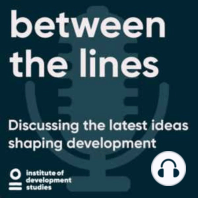37 min listen
The Water–Food–Energy-Nexus
ratings:
Length:
45 minutes
Released:
May 24, 2021
Format:
Podcast episode
Description
The world of development thinkers and practitioners is abuzz with a new lexicon: the idea of “the nexus” between water, food, and energy. It promises better integration of multiple sectoral elements, a better transition to greener economies, and sustainable development. However, there appears to be little agreement on its precise meaning, whether it only complements existing environmental governance approaches or how it can be enhanced in national contexts.In this episode of Between the Lines, IDS Fellow Shilpi Srivastava interviews Jeremy Allouche, Dipak Gyawali and Carl Middleton the editors of the book: The Water–Food–Energy Nexus: Power, Politics, and Justice.With thanks to:Between the Lines created by Sarah KingRecorded, edited and narrated by Gary EdwardsMusic credit: Crypt of Insomnia/One Day in Africa (instrumental version)/Getty ImagesRelated linksThe Water–Food–Energy Nexus Power: Politics, and JusticeInterviewerShilpi Srivastava is a Research Fellow with the Resource Politics Cluster. She is trained as a political scientist and she completed her PhD in Development Studies (Sussex) in 2015. Her doctoral research focused on the politics and practice of water regulation reform in India.Book authorsJeremy Allouche is a co-director of the Humanitarian Learning Centre and principle investigator of the GCRF-funded project Islands of Innovation in Protracted Crisis and the AHRC/DFID-funded project New Community-Informed Approaches to Humanitarian Protection and Restraint. He is a political sociologist trained in history and international relations with over 20 years research and advisory experience on resource politics (water, mining) in conflict and borderland areas and the difficulties of aid delivery in such contexts, as well as studying the idea of ‘islands of peace’.Dipak Gyawali is a hydroelectric power engineer and a political economist who, during his time as Nepal’s Minister of Water Resources in 2002/2003, initiated reforms in the electricity and irrigation sectors focused on decentralization and promotion of rural participation in governance. He also initiated the first national review and comparison of Nepali laws with the guidelines of the World Commission on Dams.Carl Middleton is an SEI Affiliated Researcher with SEI Asia Centre. His research interests orientate around the politics and policy of the environment in Southeast Asia, with a particular focus on environmental justice and the political ecology of water and energy. Our GDPR privacy policy was updated on August 8, 2022. Visit acast.com/privacy for more information.
Released:
May 24, 2021
Format:
Podcast episode
Titles in the series (59)
1: Refugee Tales - Emma Parsons by Between the Lines
